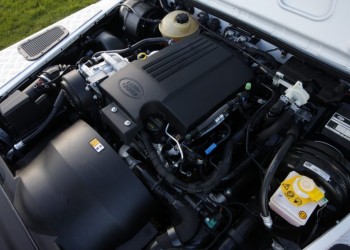PSA Group, a French manufacturer of cars is looking for new opportunities to expand. It appears that PSA is interested in adding Jaguar Land Rover to its roster, where you can already find Citroën, DS, Ambassador, Opel, Peugeot, Vauxhall, and Aixam.
Many online portals have published the news about PSA’s interest in acquiring Jaguar Land Rover which forced the Indian company Tata Motors, the current owner of JLR, to deny all claims associated with the JLR acquisition.
The buildup lasted for a couple of months, and all the recent news clearly pointed out that the British car brand is a target of the PSA group.
PSA Group, or originally Groupe PSA, is a French multinational manufacturer of automobiles and motorcycles. It currently owns and manages several major car brands, including Citroën, DS, Ambassador, Opel, Peugeot, Vauxhall Motors, and Aixam. At the same time, the PSA group is one of the world’s largest car makers, with an incredible production output of 3,78 million cars per year.
The question on the minds of almost 40,000 employees of JLR and its loyal customers is: “Who will end up as the owner of Jaguar Land Rover?”
The Papertrail Already Exists
For every acquisition, there is a plan and a very specific paper trail. In the case of JLR and PSA, there is a specific document that suggests these companies are planning something, even a possible merger. Many news portals have published the leaked information about it – the name of the document is the “post-sale integration document”.
While this document only outlines the benefits both companies will experience after a potential merger, it is still proof that something is going on.
A team of people on both sides had to sit down and analyze the current market developments from the standpoints of both the PSA group and JLR to come up with a bulleted list of benefits of a possible merger. This is proof that the plan exists and that both companies are familiar with it, if not considering it.
The Relevant Statements
Both Tata Motors and JLR officials found it important to react to the news about possible merger or acquisition. India's Tata was very clear about the news, referring to it as nothing more than mere speculation: “As a matter of policy, we do not comment on media speculation. But we can confirm there is no truth to these rumors.”
PSA Group’s spokeswoman also addressed the public elaborating the current developments on the market and the PSA’s plan for the future. She said that PSA is exploring numerous opportunities on the market as the company primary goal is to create additional value and attract more consumers.
In regard to PSA’s acquisition of JLR, she added that PSA is not in a rush to make the acquisition of any carmaker enterprize, JLR included.
During the interview of PSA’s boss, Carlos Tavares, for Autocar India, the journalist asked him about PSA’s future plans. Tavares clearly stated that PSA has been considering various partnership and acquisition options on the market for a few months now.
Tavares used this opportunity to make it clear that the PSA group could benefit from introducing a luxury brand offer to its consumers, but he also added that the PSA group has not entered negotiations, with Tata Motors yet.
Is JLR’s Struggle Real?
Over the past couple of months, JLR was in for a bumpy ride. The sales performance of this British automotive giant has dropped significantly. The last couple of months of 2018 were a disaster, some would say.
The numbers tell us that the sales fell by a troubling 6.4%. The reason for this? The demand in China’s car market has shifted, as people stopped buying cars with diesel engines and the JLR sales in China dropped by more than 40%.
In February, JLR made a public announcement regarding these developments. Due to this tremendous loss, JLR had to make plans to sustain the business. Sadly, these plans included cutting almost 5,000 jobs, and most of them were in the UK. That’s around 10% of the entire JLR workforce, which is a significant number.
On top of that, JLR had to deal with the problem of faulty CO2 emissions. The company had to recall almost 50,000 vehicles for service. Fortunately, the majority of problems related to CO2 emissions could be fixed via a simple software update.
Let’s compare some relevant stats as well. For instance, the PSA Group made revenues of €74bn in 2018. For the same period, JLR made £24.6bn. In terms of sold vehicles, the PSA Group dominates the market. It sold almost 1,000,000 cars while JLR sold 145,000 cars.
What Do Automotive Analysts Say?
Automotive analysts found these developments very interesting as well. Philippe Houchois is one of many analysts to publicly comment on the situation.
Philippe works as an automotive analyst at the investment bank Jefferie4s. According to him, we should not entirely discard the possibility of the acquisition of JLR by the PSA group.
He also stated that JLR could have many benefits from the acquisition. For instance, the major investments could help JLR speed up the new technology development and help it smoothly transition from combustion engines to electric technology.
But he also pointed out that he is not sure about the benefits the deal brings to PSA: “JLR would welcome some help no doubt in terms of trying to get some scale. It’s not clear what it adds to PSA’s core business.”
The no-deal Brexit also complicates the situation for JLR, as the company had to shut down several facilities a few weeks prior to the regular Easter holiday.
There are quite a lot of factors to consider here, and no-deal Brexit implications could possibly complicate the JLR acquisition by PSA even more. Why? Because the PSA Group is also affected by it since it owns two Vauxhall plants in the UK.
For the time being, India’s Tata remains the owner of JLR. According to the interviews and statements of both JLR’s and PSA’s officials, Tata Motors will still be the owner of JRL in the near future.






0 comments